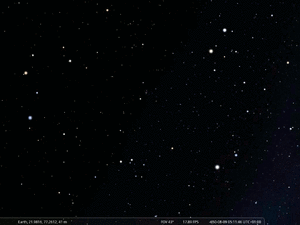Ashlesha: Difference between revisions
No edit summary |
No edit summary |
||
| (4 intermediate revisions by the same user not shown) | |||
| Line 1: | Line 1: | ||
{{DISPLAYTITLE:Ashlesha}} |
{{DISPLAYTITLE:Ashlesha (आश्लेषः)}} |
||
[[File:9 Ashlesha draw.png|thumb|The 9th Nakshatra, Ashlesha, as drawn in historical sources (WGSN 2025).]] |
[[File:9 Ashlesha draw.png|thumb|The 9th Nakshatra, Ashlesha, as drawn in historical sources (WGSN 2025).]] |
||
[[File:9 Ashlesha stellarium.gif|thumb|The 9th Nakshatra, Ashlesha, consists of five stars and is identified with the head of Hydra (WGSN 2025).]] |
[[File:9 Ashlesha stellarium.gif|thumb|The 9th Nakshatra, Ashlesha, consists of five stars and is identified with the head of Hydra (WGSN 2025).]] |
||
| ⚫ | |||
| ⚫ | |||
| ⚫ | |||
==Etymology and History== |
==Etymology and History== |
||
[[File:Tibet nakshatra 07.png|thumb|Tibet nakshatra 07]] |
[[File:Tibet nakshatra 07.png|thumb|Tibet nakshatra 07]] |
||
| ⚫ | |||
'''Name Variants:''' |
|||
[[File:Naga ashlesha bali pooja.jpg|thumb|Naga ashlesha bali pooja]] |
|||
* Āshleshā, |
|||
* Ashlesha, |
|||
* Ahya, |
|||
* Phanibha, |
|||
* Sarpa |
|||
=== Origin === |
|||
==== Identification ==== |
|||
Normally, five stars are drawn and they are identified with the stars in Hydra; δ, ε , η, ρ, and σ Hydrae. |
|||
The Yogatara (the main star) of the Vedic nakshatra is ε Hya. It was historically considered representative for the nakshatra and, thus, named after it by the IAU WGSN.[[File:Naga ashlesha bali pooja.jpg|thumb|Naga ashlesha bali pooja]] |
|||
==Mythology== |
==Mythology== |
||
Latest revision as of 06:43, 14 October 2025
Āśleṣā (आश्लेषा), "The Embrace", is the Sanskrit name for an asterism in Hydra, the head of the Watersnake (δ, ε , η, ρ, and σ Hydrae). It is considered the ninth of the traditional Nakṣatras (lunar stations) in the Vedic culture that predates Hinduism but was taken over by it.
Ashlesha is also a modern star name adopted by the International Astronomical Union in the IAU-Catalog of Star Names (IAU-CSN). Its origin is Indian. It is the name of HIP 43109 (ε Hya, HR 3482) in the constellation Hya.
Etymology and History
Name Variants:
- Āshleshā,
- Ashlesha,
- Ahya,
- Phanibha,
- Sarpa
Origin
Identification
Normally, five stars are drawn and they are identified with the stars in Hydra; δ, ε , η, ρ, and σ Hydrae.
The Yogatara (the main star) of the Vedic nakshatra is ε Hya. It was historically considered representative for the nakshatra and, thus, named after it by the IAU WGSN.
Mythology
IAU Working Group on Star Names
The name was adopted by the IAU WGSN on 2018/06/01.
Weblinks
- Website of the IAU WGSN: https://exopla.net/








